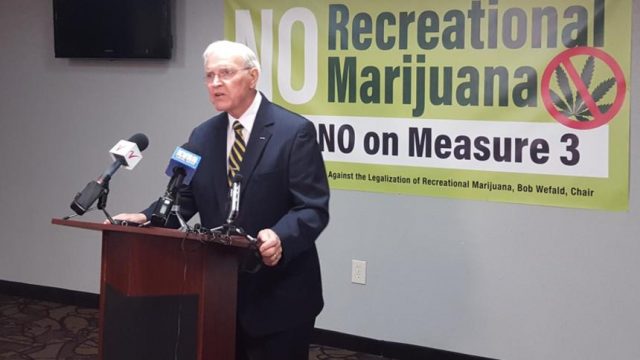When Measure 3 Opponents Say Legal Marijuana Won’t Produce Tax Revenues They’re Wrong

One of the blizzard of talking points opponents of Measure 3 (legalizing recreational marijuana) have deployed is the claim that it would not generate additional tax revenues for the state.
It’s a rebuttal to the claim from marijuana supporters that legalizing the drug would be an economic boon, bringing black market commerce into the light of day where it can be taxed and regulated. But the anti-Measure 3 folks say it isn’t so.
For example former judge Bob Wefald – a spokesman for North Dakotans Against the Legalization of Recreational Marijuana, a group formed to oppose Measure 3 – makes that claim in a letter to the editor of the Jamestown Sun:
If Measure 3 passes there will be unlimited and unregulated marijuana, and there will be no income as the measure does not make any provision for a special tax.
I don’t think this is accurate. While Wefald is correct in saying that Measure 3 doesn’t create a new tax specifically for marijuana, there are other state taxes which would apply.
I know this because not so long ago the Tax Commissioner’s office delivered a report to lawmakers making that exact point. The full document is below, but here’s the relevant excerpt:
Recently a state lawmaker and I were talking about Measure 3, and he echoed Wefald’s point about legalized marijuana not generating any new tax revenue. When I pointed out what the Tax Commissioner’s office reported to the Legislature he was dismissive. He said the Tax Commissioner’s report was met with “much laughter in the room” and that the situation would be “like any other personal property sale that is to be reported in the state and never is.”
But that didn’t ring true to me. Presumably if Measure 3 passes there will be a lawful market for marijuana which could be served by retailers. I contacted Tax Commissioner Ryan Rauschenberger directly and posed the question to him.
“Yes, if the measure passes anyone selling marijuana should be registered for a sales tax permit and collecting sales tax,” he said.
He added that, technically, existing black market marijuana dealers are supposed to be paying the tax as well. “Just to be clear, technically, anyone currently selling marijuana should be registered and collecting sales tax. The code doesn’t differentiate between an illegal and legal substance being sold,” Rauschenberger told me.
I had a chuckle at the idea of your neighborhood pot dealer reporting remitting sales taxes to the state.
Still, none of this supports what Wefald is claiming, which is that legalized marijuana would produce no revenue for the state. That is false. The whole point of this exercise is to drag marijuana from the black market into the white market.
If legitimate retailers begin selling marijuana they will collect and remit the sales tax, thus generating revenues from the state.
How much is anyone’s guess. As you can see above the Tax Commissioner’s Office couldn’t estimate it, and that’s probably fair. Nobody really knows how much marijuana is being sold in North Dakota today. But right now zero percent of those sales is taxed. If Measure 3 passes that would change.
[scribd id=1 key=key-g5C3rMLoxwuLt0vGxlfC mode=scroll]





